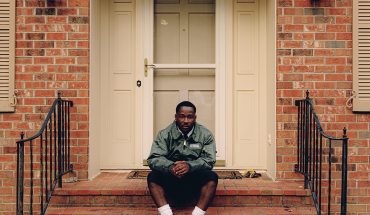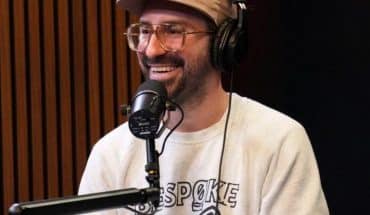by Tracy Davis
photographs by Nick Pironio
Raleigh artist Clark Hipolito is a man in constant motion, a quality he shares with much of the art he makes. His reputation was built with murals and commercial interior design – art that stays where you put it – but his interests have led him to fill a unique niche on canvases that move: surfboards, skateboards, and guitars.
“His artwork is absolutely amazing,” says master luthier Jay Lichty, who won Garden & Gun magazine’s 2010 top “Made in the South” award for his handcrafted guitars and ukuleles. One of Lichty’s ukuleles, painted by Hipolito, hangs on the wall of his dining room. “I treat this one more like art. It’s just too pretty to keep in a case. And honestly,” he pauses midsentence, examining the instrument, “I’m still not sure how he pulls them off. Is this gold leaf? It’s gorgeous.”
A Connecticut native, Hipolito, 45, first found his inspiration in the Atlantic Ocean. During a 2003 trip to Charleston, where he was creating custom interiors and murals, Hipolito headed out to Folly Beach, noticed that the waves were great, and decided to rent a surfboard. He ended up with a decrepit old board and bought it on impulse. “If a board could have rust, this one would have.” He cleaned it up, painted it with a faux wood finish, “put art on it, and then rode it.” The board got attention. Soon Hipolito was painting boards for other surfers, and next thing he knew, he had a 15-board show in downtown Wilmington. Surfboards eventually led to instruments.
Serendipity also played a role early on. After graduating from Seton Hall with degrees in business and design, Hipolito worked as an on-air graphics designer at MTV Networks in New York. He saw murals being painted and thought, “I want that. So, I started being an artist.” In 1994, he founded The Art Company, Inc., which he still runs, to create custom art. At about the same time, Hipolito moved South. Stints in Atlanta (“meh”) and Charleston (“liked but didn’t love”) failed to win him over, so a friend suggested he check out the Raleigh-Durham area. His introduction to the Triangle was a walk down Franklin Street in Chapel Hill. Everything clicked. “I loved it. Lots to do, pretty people, everyone’s friendly, good cost of living. All the basics. I thought, give it a year.”
Hipolito decided on Raleigh, setting up in a warehouse on Yonkers Road where, surrounded by purveyors of lumber, lighting, and plumbing, he figured he could draw on the area’s innate grit and build-it vibe to turn the place into a SoHo artist’s loft. “Nope,” he says. “Completely didn’t work.” But a mural he painted there caught the eye of a couple shopping for tile and led to his first real job in Raleigh: a mural in their Italian restaurant, Casalinga Ristorante, at the time a popular spot on Capital Boulevard. The mural job snowballed into a collaboration to revamp the entire restaurant, and ultimately paved the way for fruitful connections with area builders.
That ability to spark connection is another of Hipolito’s talents. Quick to smile, quick to make friends, quick to say yes, he’s not a “mull it over” kind of guy. That translates to an aptitude for “connecting the dots,” as he puts it, with the dots being people, ideas, and projects.
From the start, both his clients and his art have been diverse. Early mixed-media commissions came from the Carolina Hurricanes and Walnut Creek Amphitheatre, and his paintings have appeared in TV series like Dawson’s Creek and Sex and the City. His art reflects influences as diverse as Roy Lichtenstein’s blending of text and image and the classical forms of Michelangelo. His work is also as likely to be on the ceiling or floor as it is to adorn a wall.
So it was only natural that Hipolito – and his art – would go off-road.
Things That Go
When he first started painting surfboards, “I had no idea how to price them,” Hipolito says. For lack of a better plan, he created a silent auction with bid sheets at his first show. It created buzz from the start – it didn’t hurt that there were film crews in town – and prices shot up. The boards sold out the first night. “I thought, ‘I need to stick to this!’ It was killer.”
Surfboards led to skateboards, and then came the leap to guitars. That’s no surprise to anyone who knows Hipolito, an avid music fan. Guitars are “an intimate canvas,” he says. “You can focus.” He paints them on commission and in live settings, including at the Bonnaroo music festival and at Raleigh nonprofit Band Together’s annual Main Event.
The 2010 Band Together show, with headliner Michael Franti, made for an especially serendipitous connection. “I’m painting live while Franti does his thing,” he says, “and after the show Franti tells me that he loves it. Then he says, ‘Got a minute?’” Franti showed Hipolito his favorite acoustic guitar and asked him to paint it, but there was a catch: It was the only acoustic Franti had with him on tour, and he needed it in Asheville, ready to play, less than 48 hours later. “If you can do it,” said Franti, “take it.”
“I went back to my house and got to work that night.” says Hipolito. Several hours later, his girlfriend drove Hipolito – borderline delirious from lack of sleep and a head full of lacquer fumes – to Asheville. He delivered it to a delighted Franti, and more projects came his way, all via word of mouth, including two guitars for members of Journey and an electric bass for the bassist of the rock band Umphrey’s McGee.
“I have huge gratitude,” says Hipolito. “I get to see someone amazing playing my guitar on stage. And when those artists say good things about my art? It’s the ultimate gratification.”
That appreciation for the talents of other artists – “the makers,” he says – fostered his collaboration with guitar maker Lichty, and with East Coast Surfing Hall of Famer and renowned surfboard shaper Will Allison, who approaches boards as functional sculpture. Their 2011 Birds of a Feather show, featuring Hipolito’s art on Lichty’s instruments and Allison’s surfboards, was held at Deluxe in Wilmington. It brought together everything Hipolito loves.
“Those guys are masters,” says Hipolito. “There was a symbiosis, as well as a generational thing – these three compatible arts coming together.”
For his part, Lichty met Hipolito when his client Mike Gossin of the band Gloriana commissioned a Lichty guitar, and wanted Hipolito’s art on it. Lichty wasn’t sure that was such a good idea. “The top of a guitar is the main tone producing part of it,” he explains, “so any art has to be absolutely thin, with no depth. Put too much paint on there, it’ll mess up the sound.”
But he was willing to try. After Lichty built Gossin’s instrument, Hipolito came to his Tryon workshop to paint it. “He got there about 7 p.m.,” Lichty says. “I eventually went to bed, and when I got up at seven or eight the next morning, he was just finishing up,” recalls Lichty. “Then he heads back to Raleigh. He’s got some energy.” The two later met in Wilmington to deliver the instrument to Gossin, who loved how it looked and how it sounded. Says Lichty, “The consensus was, this was such a cool thing. Let’s do a project together.” The result includes the ukelele he now admires on his dining room wall.
How he does it
Hipolito works in all mediums, but acrylics are his favorite. “You can do anything with them. They dry fast; they’re compatible with any surface.” And they take well to being sealed, which is especially important for art that has a job to do. Surfboards need resin; guitars need lacquer. “I’ve seen oils dissolve under a clear coat,” he says. “Not cool.”
Because much of his art is made in public or commercial spaces, he doesn’t get many stretches of alone time with room for his thoughts to wander. So the solo all-nighter has become his favorite time to paint and create. “I’ll start something at maybe 11 or 12, and stay with it till 4 or 5,” he says. “Then sleep! And then head out for on-site stuff.”
He works in his studio and at his home, both in Five Points, and also in a space above Wine On Main in Clayton, which he co-owns with Temple Phipps. He likes that the wine shop has become a meeting house of sorts for diverse groups in the community, and he has immersed himself in the city, chairing veterans’ memorial and public sculpture trail projects there. “Clayton. I love it. That main street is Glenwood South twenty years ago,” he says. “Just you watch!”
Over on present-day Glenwood South, Hipolito’s newest work is at Devolve, a motorcycle and outdoor lifestyle shop. His surfboards are for sale, his murals are on the walls, and his passions are represented: art, travel, and bikes. Hipolito got his first motorcycle as a kid. He and his father chanced upon a bike in a random shop, and decided it was meant to be. “It fit in the trunk,” he says with a grin. “I can still see it. A Suzuki JR50.”
If there’s a downside to living in-the-moment as emphatically as Hipolito does, it’s that there aren’t as many chances as he’d like to savor the moments as they come. There’s too much he wants to do.
The top of that list: work with the band Widespread Panic. And, he adds, “I’d kind of like to do a hotel. Something in downtown Raleigh. A cool hotel.” Unlike Hipolito, a hotel just might hold still.














